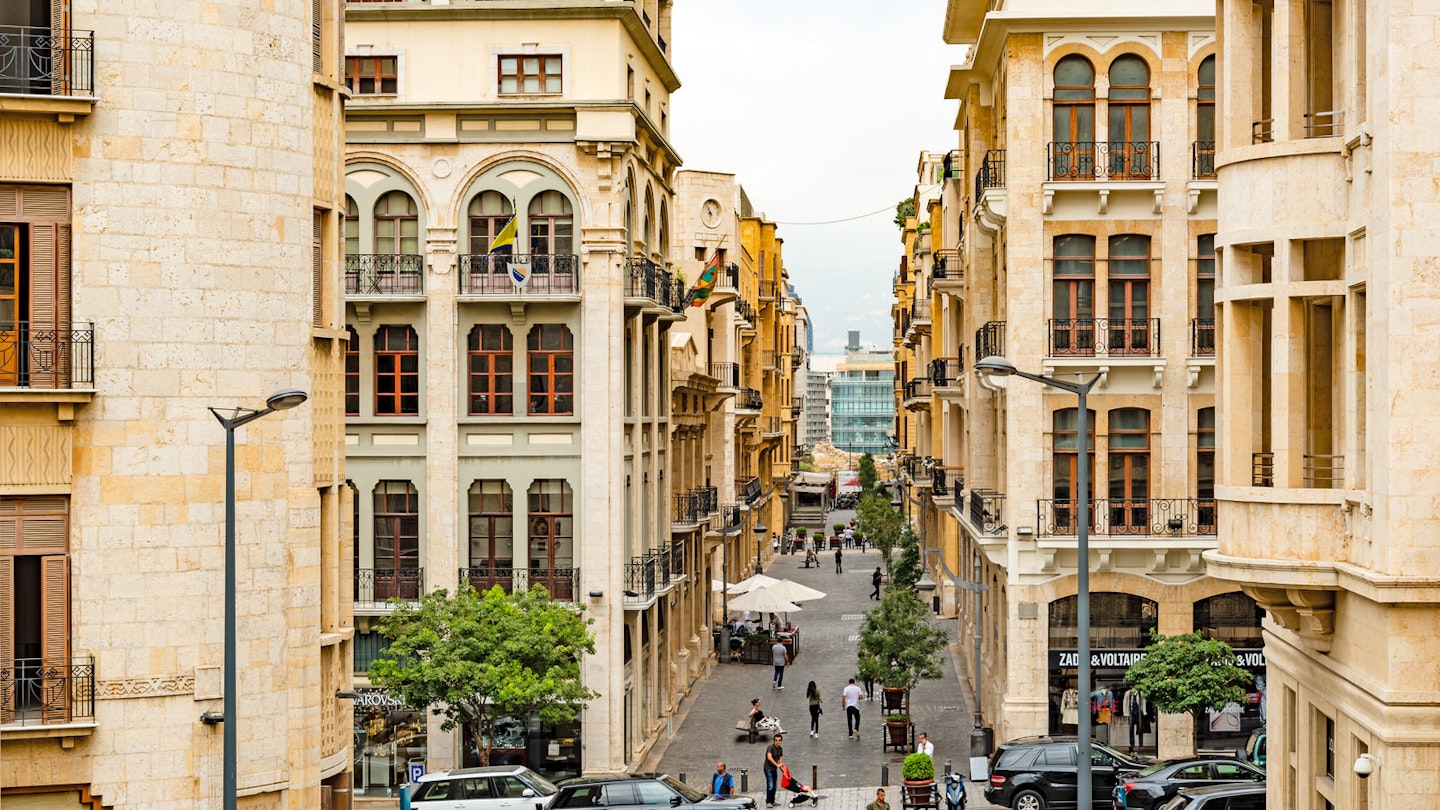Discovering the Neighborhoods of Beirut
For a city with such a storied reputation, Beirut is geographically quite small. You can walk across it in about an hour, traversing districts rich in history, diverse confessions, and iconic sites. The beauty of Beirut’s neighborhoods can be found by meandering through the streets, enjoying the scent of jasmine, and frequently stopping for coffee with local residents.
Learn the phrase ahla w sahla – ‘welcome’ in English – as you’ll hear it around every corner.
Hamra
Hamra is the bustling cultural heart of Beirut. It was here in the 1950s and ’60s that Beirut first began its transformation. The cafes of the region attracted intellectuals from the nearby American University of Beirut, fostering discussions about politics over cigarettes and espresso. While the district was the epicenter of Lebanon’s first diverse arts scene, today it’s nice to imagine the elderly men ambling down Hamra St in dapper suits are just the leftists who never left.
Tour the leafy AUB campus for an afternoon, and don’t forget to visit the university’s excellent archaeological museum. Pop into the bookshops along the main thoroughfare and then settle into a cafe such as Mezyan or T Marbouta for a sundowner and a delicious dinner of Lebanese mezze. If it’s the weekend, stick around Mezyan for live Arabic music and dancing that lasts nearly all night.

Achrafiyeh
A fascinating mix of sleepy tranquility and elegance, Achrafiyeh serves as a charming antidote to the energy of Hamra. Until the mid-20th century, Achrafiyeh comprised a patchwork of grand estates and shepherds’ paddocks. Although many old houses have been replaced with modern high-rises, the discovery of a dilapidated Ottoman-era palace at the end of a narrow alley is all the more delightful. Visit the Sursock Museum to view 20th-century Middle Eastern art, and be sure to glance at Sursock Palace across the street, the best remaining example of an old Achrafiyeh house. Cross busy Charles Malek St to explore a delightful maze of winding streets for sustenance, with close options like the Armenian restaurant Almayass. Later, head to Metropolis Sofil, Beirut’s only art-house cinema for an evening of entertainment. Note that Achrafiyeh is notably quieter on Sundays.

Badaro
Badaro proper features one main road (Badaro St) and several smaller, perpendicular streets dotted with bars and cafes. While it’s pleasant for a drink or a meal, venture outside the neighborhood’s borders to experience more of what Beirut has to offer. The National Museum is renowned for its extensive Phoenician artifacts and fascinating history of preservation during the Lebanese civil war. A visit to Horsh Beirut, a vast park at the other end of Badaro St, provides lush green space for relaxation. Enjoy a day at the Beirut Hippodrome watching horse races, followed by coffee and conversation at Roy’s Public House, a great spot for a Sunday afternoon. For a lively evening, venues like Attic, Troika, and Kissproof offer exciting nightlife options.
Gemmayzeh
Once a frontrunner in Beirut’s gentrification in the 2000s, Gemmayzeh experienced a lull but is now bouncing back. Like many neighborhoods, Gemmayzeh is centered around a bustling thoroughfare, Gouraud St, which runs from Martyrs Sq in Downtown to become Armenia St in Mar Mikhaël. Primarily a dining and drinking destination, you’ll also find the excellent L’Artisan du Liban, a handicrafts shop perfect for classy souvenirs. Enjoy affordable dining at local favorites like Le Chef and Cafe Em Nazih. The nightlife scene is thriving, with Torino Express, Gemmayzeh’s first bar, remaining a staple for an exciting night out. Alternatively, for a relaxed daytime atmosphere, the trendy cafe Sip is a perfect choice for work or leisure.

Mar Mikhaël
Mar Mikhaël is a neighborhood that has undergone rapid transformation. Just six years ago, it was primarily filled with refrigerator repair shops and grandmothers engaging in gossip and vegetable shopping. However, since the arrival of vibrant bars and a younger crowd around 2012, the area’s appeal has surged, resulting in apartment values skyrocketing. The bars along Armenia St consistently serve cocktails and the beloved local Almaza beer, with popular spots like Internazionale and Anise. Moreover, a lucrative food and shopping scene has flourished, particularly in the alleyways connecting Armenia St to the nearby motorway. The neighborhood dazzles at night, filled with twinkling lights, but a stroll in the afternoon sun is equally enchanting. A typical Beirut itinerary includes visiting Plan Bey for local art and handiwork, followed by dinner at Makan or Enab, and drinks along the strip.

Downtown
All paths in Beirut lead to the downtown area, which holds an ancient Roman road from Damascus to the Mediterranean. After almost complete devastation during the 15-year civil war ending in 1990, the area has been redeveloped into elegant buildings and luxury shops, aiming to attract affluent shoppers. The architecture features an artfully distressed Italianate-Arabesque style that manages to retain both charm and appeal. Fashion enthusiasts should explore Aïshti, Lebanon’s premier luxury department store, for a selection of both local and international designer pieces. For history lovers, beyond the Roman road, there are ancient Roman baths, plus a fascinating museum beneath the St George Greek Orthodox Church highlighting Beirut’s historical layers from pre-Roman times to the Ottoman era. Finally, the exterior of the Mohammed Al Amin Mosque is visually striking, and while its interior may be less impressive, a rooftop cocktail at Iris offers fantastic views to conclude your downtown experience.




